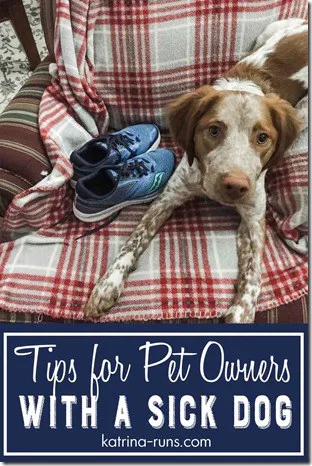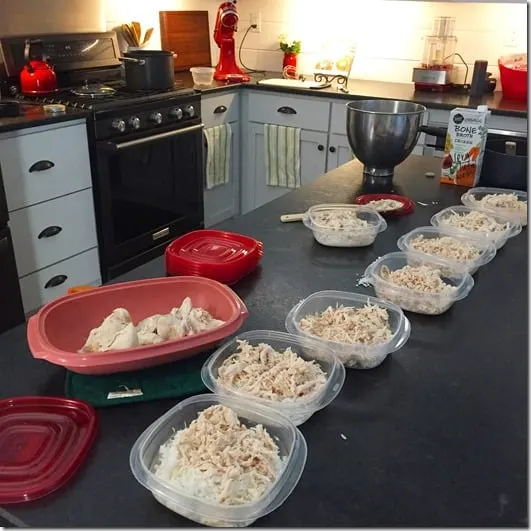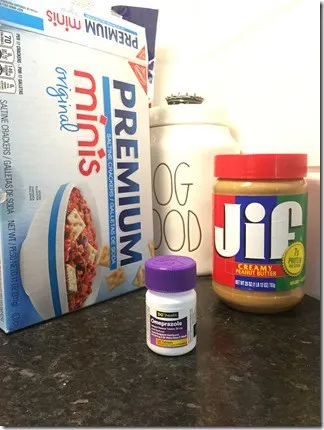Just like with most surprise life events, a sudden dog illness is never easy and rarely quick. We have had Atlas for almost a year, and he is such a huge part of our life. But what happens when dogs get sick, and stay sick, with no rhyme or reason? Three weeks later, here are my tips for pet owners with a sick dog.
Determine if it’s vomit or regurgitation
This is not a fun subject, but there is a difference between the two. Regurgitation begins in the esophagus and includes water, saliva, and undigested food. The biggest difference is regurgitation happens quickly with no hacking or coughing or visible signs the dog is about to spew. Vomiting originates in the stomach and includes partially digested food and bile.
There is usually prolonged coughing or hacking before the event. Both issues should be monitored closely because prolonged events of both cause major health problems for the dog. Atlas started vomiting in the early morning hours so we knew exactly what he was doing.
Investigate the obvious reasons for a sick dog
This tip is the most obvious. Rule out any dog food changes, accidental ingestion of people food, poisons, objects. This sounds easy, but you would not believe the different paths we went through to figure out Atlas’ problem. We thought we narrowed it down to azaleas, which are poisonous to dogs. Then a couple of days later, we stumbled upon information about tulips bulbs being very toxic to dogs. Guess what we had just planted? 20 tulips. We still had another 50 bulbs in the garden wagon waiting for dry weather to plant. We were sure Atals had chewed one.
Take very detailed notes
When Atlas threw up 4 times in a couple of hours that morning, I started a detailed timeline of what was going on. We both agreed he should see the vet when they opened. Having a detailed report for the vet to read and analyze is better than walking in with “my dog is sick” and going through the questions and answers. Most of the first round of questions were answered in my report. Keep up the notes during treatment in case you have to revist, which we did have to do.
Have a plan for vet care
This is a very personal and case-by-case tip. We all rush to Dr. Google to get information when something is suddenly wrong with our pets. Some people like the wait-and-see approach. Some immediately go to the vet. We chose the latter because we wanted to rule out an obstruction and get some baseline blood results.
Because Atlas is still a puppy, he still loves to chew things. Also, we both still vividly remember the loss of our cat, Frankie to lymphoma. We wanted to know if there was anything to see in Atlas’ bloodwork and face it head-on. After getting those two things ruled out, we shifted to the wait-and-see approach.
Ask questions
Just like with children, I’m assuming, all invested parties need to know all the information regarding care, medications, side-effects, next steps, etc. If there are any questions or clarifications, do not hesitate to call your vet office. Not every family considers the pet as a family member, and that is their choice. We have always treated our pets as family. When Atlas wasn’t getting better, we talked to our vet.
So what happened to Atlas?
He came home from the vet after getting some IV meds and had a great night. The vet said he probably ate the wrong grass, weeds, bugs, etc. Something had upset his stomach, but with no obstruction and clear bloodwork, there was nothing critical.
For the next 2 weeks, Atlas had a cycle of one night of sleep, the next night sick and usually beginning in the early dawn hours and lasting for 3-4 hours. We were all miserable. I made him bowls of chicken and rice with some broth and he loved it. But he was like clockwork. 48 hours fine, then a night of throwing up.
Remember those detailed notes and reports I mentioned up there?
Those came in VERY handy. We knew we needed to talk to the vet again because he should be getting better. I gave my notes to Stephen to give to the vet. I had a feeding log, a detailed timeline of all the vomiting, the nights when he was acting fine, pooping problems, not pooping problems (pumpkin worked GREAT for that!), etc.
Dr. Canant was quick to give us a verdict. He had a mix of “empty stomach” syndrome with the fancy name of Bilious Vomiting Syndrome and excess acid reflux from his high-fat puppy food. We don’t know which came first, but the remedy was simple. Give Atlas an acid-reducer early evening an hour before dinner and give Atlas a snack right before bed.
Two nights of this, our puppy was 100% back to normal. We slowly transitioned him from chicken and rice to his new low-fat/weight management dog food. We do treat him with low-fat treats, bananas, plain potato and chicken and rice. He can’t afford to lose any weight so we treat him often. The only “fat”treat is less than a teaspoon of peanut butter with 2 crackers so he will take his Prilosec.
After just one year of being puppy parents, we are on a learning curve. But these tips have helped us on a few occasions with Atlas.



